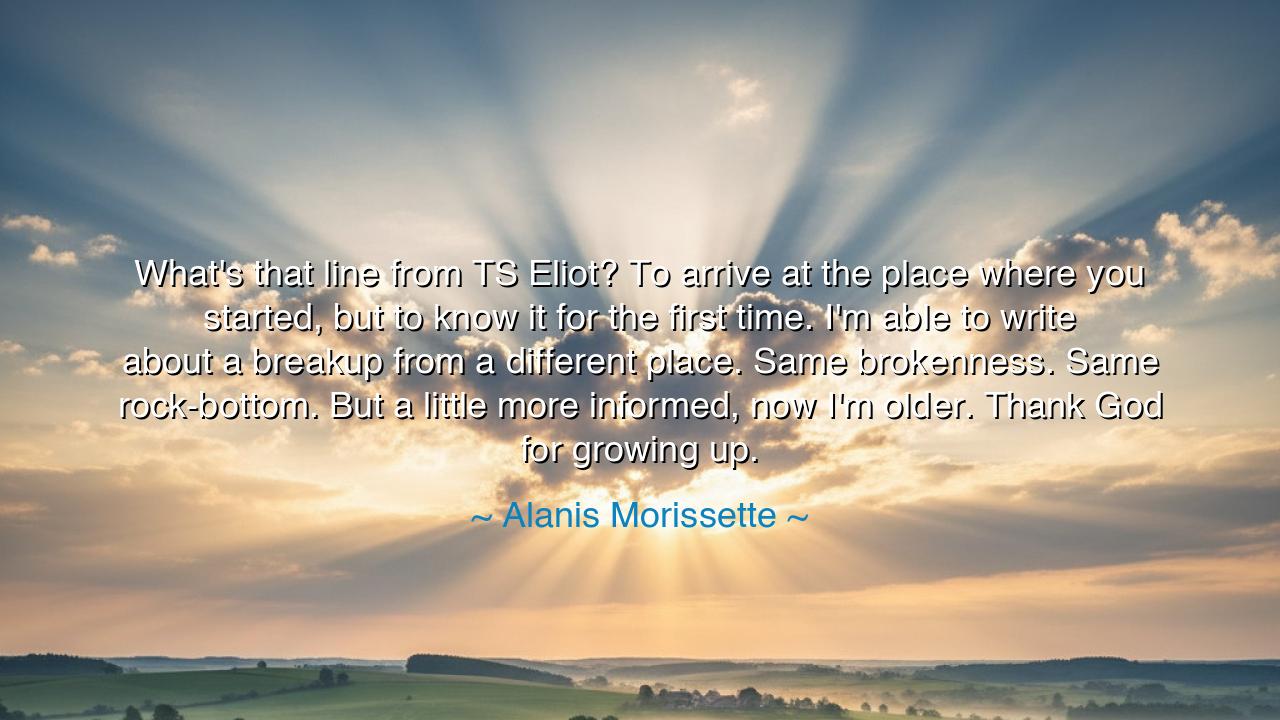
What's that line from TS Eliot? To arrive at the place where you
What's that line from TS Eliot? To arrive at the place where you started, but to know it for the first time. I'm able to write about a breakup from a different place. Same brokenness. Same rock-bottom. But a little more informed, now I'm older. Thank God for growing up.






Hear the voice of Alanis Morissette, whose songs have carried both lamentation and triumph, as she reflects with wisdom drawn from years of struggle: “What’s that line from T.S. Eliot? To arrive at the place where you started, but to know it for the first time. I’m able to write about a breakup from a different place. Same brokenness. Same rock-bottom. But a little more informed, now I’m older. Thank God for growing up.” In these words she joins her voice to that of the poet, for both speak of the eternal cycle of experience—how we return again and again to the same wounds, but with deeper understanding each time.
Eliot, in his Four Quartets, wrote of time, memory, and wisdom. His line captures the mystery that we often return to familiar places, yet see them with new eyes. A child may walk the same path as an elder, but the elder perceives layers of meaning invisible to youth. Morissette echoes this when she speaks of breakups—a pain she has known before, one that feels the same in its brokenness and despair, yet now, with the years behind her, she beholds it differently. Experience has not spared her the wound, but it has given her language, perspective, and gratitude.
This is the nature of growing up. It is not the end of pain, but the transformation of it. The same trials revisit us—loss, heartbreak, failure, disappointment—but we do not face them as the same person. Each return to rock-bottom is an arrival at the place we started, yet with greater knowledge of ourselves, greater compassion, and sometimes, greater humility. What once seemed like the end of the world now becomes a teacher. What once silenced us now inspires expression.
The ancients, too, spoke of this wisdom. The philosopher Heraclitus declared, “No man ever steps into the same river twice, for it is not the same river, and he is not the same man.” Morissette’s reflection lives in this same truth. Though the river of heartbreak may feel familiar, she is no longer the same woman who entered it years before. She has gained the strength of perspective, the insight that time alone bestows, and the gratitude that such growth is even possible.
Consider the story of Nelson Mandela. When he left prison after twenty-seven years, he returned to the same South Africa where he had been condemned. Yet he saw it anew. What once had been a land of bitter oppression, he now viewed with the eyes of patience and reconciliation. He had arrived at the same place, but for the first time, he saw its potential for healing. In his long suffering, he had grown up—not in years alone, but in wisdom, so that he could meet old pain with new understanding.
The lesson here is profound: life will return us to familiar wounds, but maturity transforms how we bear them. We cannot avoid suffering, but we can allow it to teach us. When pain revisits you, do not despair that you are back where you started. Instead, ask: “What do I see now that I could not see then?” This is the hidden gift of time—that we are broken in the same places, but each time, we know more about how to rise.
Practical steps are these: when hardship strikes, recall past trials you have endured. Reflect on how you survived, on what you learned, and let that knowledge steady you. Write about your pain, as Morissette does, for expression transforms wounds into wisdom. Be grateful, not that you suffer, but that in suffering you are no longer as blind as you once were. This gratitude is the seed of resilience, the sign that growing up is taking root within you.
Thus remember the united wisdom of Eliot and Morissette: we return to where we began, but we see it as though for the first time. The circle of life does not trap us, it deepens us. The pain may be the same, but you are not. And in this lies the quiet triumph of maturity—that even in brokenness, there is growth, and even at rock-bottom, there is the blessing of wisdom gained.






AAdministratorAdministrator
Welcome, honored guests. Please leave a comment, we will respond soon